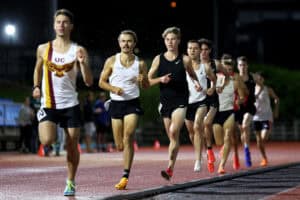It’s just a long day out there on the road but it is also a great adventure.

As we started the quadriceps-pummeling descent of Field’s Hill in the 2012 “down” Comrades marathon, Zola Budd-Pieterse turned to me and muttered “Jissie dis ver” (How much further do we still have to run)?
Zola and I had been running together for at least an hour. Earlier in the day I had been about to pass her, when in a rare moment of genius, it dawned on me that if I wasn’t going to win the race the next best thing would be to finish with Zola. Outstanding marketing opportunities like this present themselves only very occasionally.
“Amper daar mense” (We’re nearly there), a runner with a heavy Afrikaans accent next to us shouted. “It’s only 21 kilometres to go, just a short, klein, half marathon. And look, you can see the Indian Ocean in the distance.”
Our Afrikaans friend was right on two counts. Through the haze we could vaguely make out Durban’s distant skyline and a pale blue sea. And in relative terms we were “nearly there”.
After all, we had already run 70 kilometres to reach the top of Fields Hill. We had lined up in the chilly, dark dawn outside the Pietermaritzburg City Hall and now we were busy getting sunburnt.
This memory suddenly crossed my mind a few weeks ago at the finish of the Two Oceans when an exhausted athlete who I have been advising moaned despairingly to me, “I’ll never be able to run the Comrades marathon. I’m completely broken, and I have only run 56 kilometres. There is no possible way I can run another 30 or more kilometres. I can’t take another step.”
ALSO READ: An August run means May is the new March
ALSO READ: Key ingredients of a successful training programme
ALSO READ: Do what I say, not what I do
My weary Two Oceans runner is not alone in her pessimism. Every Comrades runner is riddled with insecurity and doubts soon after finishing their qualifying marathon or the season’s first ultramarathon. Ninety kilometres of brutal hills suddenly becomes a bridge too far, an insurmountable barrier.
I wonder how many runners have abandoned their Comrades marathon dreams because of these nagging doubts which are triggered by suffering at a shorter distance. Those insecure runners include Comrades gold medallists, and race champions. Even seemingly confident elite runners sometimes have their doubts.
But they shouldn’t be dissuaded. Of course, the Comrades marathon is demanding. That’s what makes it such a worthy challenge. If it wasn’t tough anybody could earn a coveted Comrades medal, but Comrades finishers are not “anybodies.”
They have exceptional mental strength. They can also reflect on and be encouraged by the tens of thousands of runners who have finished those 90 kilometres, many of whom would not object to being described as “slow and unathletic.”
What are the special ingredients of Comrades success? And what enables ordinary runners (including my despondent Two Oceans friend) to finish the Comrades marathon and earn their finishers’ medals?
- By August 28 they will all be far fitter than they are today. There are many more weeks of training ahead. There are long runs, big weeks, hill sessions, and speedwork, all designed to build endurance, speed and strength. On race morning thousands of very fit runners will line up outside the Pietermaritzburg City Hall.
- On that special morning, runners will be filled with a sense of purpose. The allure of the Comrades is very powerful. Without wanting to belittle any other race in any way these runners will realise that this is not their qualifying marathon, and this is not their club long run. This is one of the world’s most famous marathons. This is a race that is rich with history and steeped in charisma. Its traditions are spine tingling; Chariots of Fire, the wall of honour, the famous hills and landmarks, green numbers, cut-off guns, and stories of heroes and heroines. The Comrades is a heroic challenge, a modern-day Iliad or Odyssey where every runner is a warrior.
- Many repeat this mantra to themselves; “I want to write my own paragraph in this epic adventure. I am ready to go to war. I will finish.”
- Finally, the most important muscle, the brain plays its part. It is an extraordinary organ and once prepared for the task ahead it galvinises the mind and body for battle, rapidly ratcheting up the mind in irreversible steps. “I’ve done the training, I’m ready”.
At the risk of exaggeration, it is true that once the mind is persuaded the task is done.
A month after Comrades a 21km race will seem like a massive task but on race morning 90 kilometres is possible.
Comrades is possible my Two Oceans friend. It’s just a long day out there on the road but it is also a great adventure.
As Zola and I were approaching 45th Cutting, towards the end of that 2012 Comrades, our Afrikaans running companion suddenly joked, “C’mon everybody it’s less than 10kms to go…let’s sprint!“
I understood what he meant.
Support Local Journalism
Add The Citizen as a Preferred Source on Google and follow us on Google News to see more of our trusted reporting in Google News and Top Stories.






